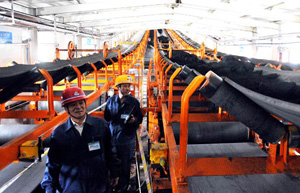The growth slowdown in China has already affected Australian mining companies like BHP Billiton Ltd and Glencore Plc which face rising costs and falling prices in China. The new coal tax policy would be another challenge for these companies, experts said.
According to customs data, Australia, Indonesia, Russia and Mongolia were the top four thermal coal suppliers during the first eight months of the year.
From January to August, China imported 40.28 million tons of thermal coal from Australia, 33.43 million tons from Indonesia, 10.61 million tons from Russia and 2.5 million tons from Mongolia.
The second-biggest coal supplier Indonesia will not be affected by the new policy because China has signed a free trade agreement with the Association of Southeast Asian Nations.
"Indonesia is one of the biggest thermal coal suppliers to China. Both the traders and power companies will turn to Indonesia for purchases if Australian coal prices increase," said Dai. "It will also help boost domestic thermal coal prices."
During the first six months of the year, China imported around 28 million tons of thermal coal from Indonesia, accounting for 37 percent of the total thermal coal imports, customs data show.
In addition to the ASEAN, countries like Chile, Pakistan, New Zealand, Peru and Costa Rica all have free trade agreement with China and they will continue to enjoy zero tariffs on coal exports to China, according to ICIS C1 Energy.
Based on the latest data from the US Energy Information Administration, US thermal coal exports to China totaled 83,940 tons in the first quarter of the year.
Forbes reported that many top US coal producers have seen big drops in recent months due to a number of factors, including deteriorating fundamentals for the US thermal coal markets, reduced exports and concerns about shifts from coal-to gas-based power supplies.
Given the relatively small quantity of US coal exports to China, it will not be affected much, Dai said.
Deng with ICIS C1 Energy said although the new policy will help domestic companies for a short period, it cannot fix the contradiction between overcapacity and weakening downstream demand in China.
From 2002 to 2012, China's coal industry experienced the so-called Golden 10 Years when coal prices kept rising and the industry spawned thousands of billionaires. The high profitability also attracted many new investors to the coal-mining sector.
However, with concerns mounting over issues like air pollution, the government decided to shut small-scale coal mines and upgrade production technology to improve the environment.
This, in turn, prompted many companies to expand production capacity to avoid being eliminated, making the overcapacity problem even more severe in the industry.
Since 2012, the country's coal prices have started declining due to shrinking demand from steel mills and power stations. The rising coal imports also added to the woes of domestic companies.
Faced with a piquant situation, the government decided to step in and asked State-owned coal companies to cut production from last month to prevent price competition.
|
 |
 |
| China's thermal coal import outlook remains weak: Fitch | China reforms resource tax on coal |
